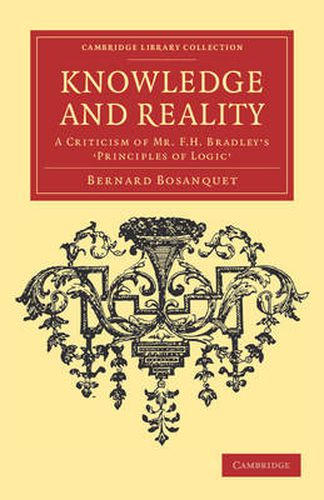Readings Newsletter
Become a Readings Member to make your shopping experience even easier.
Sign in or sign up for free!
You’re not far away from qualifying for FREE standard shipping within Australia
You’ve qualified for FREE standard shipping within Australia
The cart is loading…






After more than a decade teaching ancient Greek history and philosophy at University College, Oxford, British philosopher and political theorist Bernard Bosanquet (1848-1923) resigned from his post to spend more time writing. He was particularly interested in contemporary social theory, and was involved with the Charity Organisation Society and the London Ethical Society. He wrote numerous articles before beginning this book, which was his first and was published in 1885 as a response to the Principles of Logic, published in 1883, by his contemporary F. H. Bradley (1846-1924). Bosanquet, who was deeply influenced by the German philosopher Hegel (1770-1831), argues that there are ‘signs of a philosophical movement in this country which may assimilate what is really great in European philosophy, without forfeiting the distinctive merits of English thought’. With this as the framework, the book examines the relationship of judgment and logic to knowledge.
$9.00 standard shipping within Australia
FREE standard shipping within Australia for orders over $100.00
Express & International shipping calculated at checkout
After more than a decade teaching ancient Greek history and philosophy at University College, Oxford, British philosopher and political theorist Bernard Bosanquet (1848-1923) resigned from his post to spend more time writing. He was particularly interested in contemporary social theory, and was involved with the Charity Organisation Society and the London Ethical Society. He wrote numerous articles before beginning this book, which was his first and was published in 1885 as a response to the Principles of Logic, published in 1883, by his contemporary F. H. Bradley (1846-1924). Bosanquet, who was deeply influenced by the German philosopher Hegel (1770-1831), argues that there are ‘signs of a philosophical movement in this country which may assimilate what is really great in European philosophy, without forfeiting the distinctive merits of English thought’. With this as the framework, the book examines the relationship of judgment and logic to knowledge.